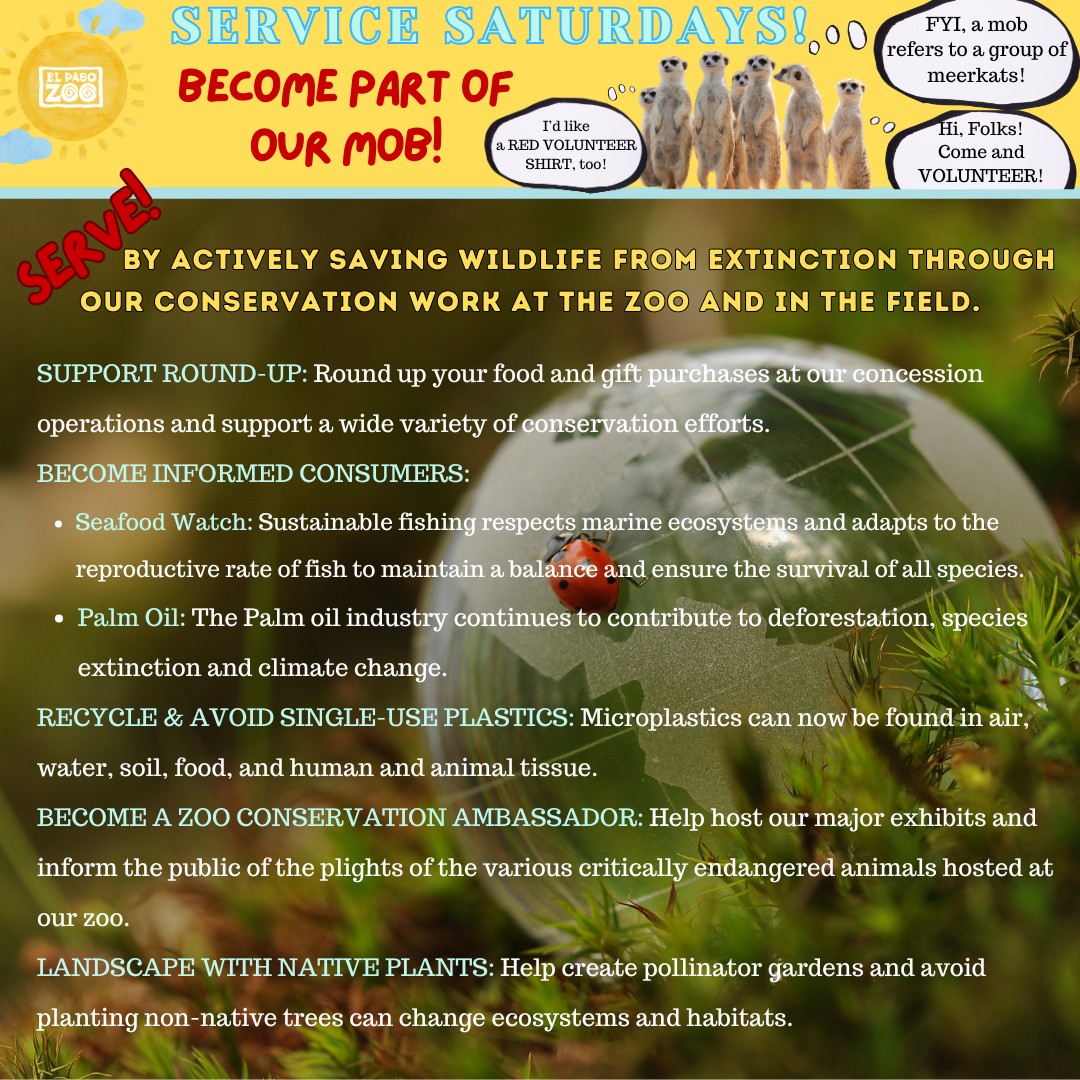- Serve and contribute to saving wildlife from extinction through active conservation efforts.
- Support conservation initiatives such as the Round-Up program and learn about its impact.
- Promote informed consumer choices focusing on seafood sustainability and the dangers of palm oil.
- Encourage recycling, plastic reduction, and sustainable practices for environmental health.
- Inspire community involvement through roles like Conservation Ambassadors and native plant landscaping.
Our natural world faces significant challenges today, with human activity threatening countless species. Yet, active participation in conservation efforts offers hope. Welcome to Service Saturdays! Come join our mob—our group of conservation-focused enthusiasts—to make a tangible difference for our planet. Inspired by the meerkat, our Volunteer Mascot, we model its community-centric behavior to spearhead efforts in preserving wildlife. By participating in programs at the zoo and in fieldwork, volunteers can serve and contribute to conserving wildlife from extinction.
Conservation work takes many forms. Zoos play a crucial role in this initiative. They provide a unique environment for species maintenance, scientific research, captive breeding, and public education. The zoo acts as a sanctuary for endangered species and embraces the responsibility of reintroducing animals into the wild. That’s where Service Saturdays come into play. Volunteer participants learn, share, and apply knowledge gained within zoo walls to conservation efforts outside. They’re vital in performing tasks such as habitat restoration and species monitoring, directly impacting wildlife survival rates.
Supporting conservation efforts also requires financial backing and community engagement. The Round-Up program is one such initiative, allowing individuals to assist financially by rounding up purchase amounts and donating the difference to a Conservation Fund. This supports critical projects aimed at saving endangered species in their natural habitats. Participants can see their contributions manifest in real-world conservation advances, creating a fulfilling cycle of support and result.
Being an informed consumer is another essential component of conservation strategy. Two vital areas where consumer choices play significant roles are seafood sustainability and palm oil production. Through programs such as Seafood Watch, individuals can understand which seafood products are sustainably sourced. This empowers decisions that prioritize ocean health and marine species conservation. The Palm Oil Crisis shines a light on deforestation and habitat destruction driven by palm oil cultivation. By choosing certified sustainable palm oil products, consumers can mitigate this impact, protecting critical biodiversity in tropical regions.
Recycling and reducing single-use plastics are practical ways to positively influence conservation. Plastic pollution is a major environmental issue, causing harm to wildlife both on land and at sea. Our initiatives encourage the reduction of plastic use through recycling practices and the promotion of alternatives. Educating communities about these issues creates awareness, fostering collective responsibility and action to tackle these challenges.
Active volunteerism extends beyond traditional conservation work. As Conservation Ambassadors at the zoo, individuals can engage with the public, sharing insights on exhibits and encouraging environmental stewardship. This interaction educates visitors on crucial ecological issues, extending the zoo’s educational reach and inspiring further community involvement.
Landscaping with native plants and creating pollinator gardens exemplify sustainable living in action. Native plants foster biodiversity by providing natural habitats for local wildlife. Pollinator gardens support essential organisms like bees and butterflies, ensuring the pollination of local crops and plants. These gardens are crucial for maintaining ecosystem health and resilience, offering practical benefits like water conservation and reduced gardening costs.
Through these various kinds of participation, Service Saturdays serve as a catalyst for change, empowering individuals to act. We invite people to join and support these initiatives, whether through hands-on conservation work, financial donations, consumer decisions, educational outreach, or sustainable gardening practices. Each participant becomes part of a dynamic community dedicated to addressing pressing environmental concerns. By embodying the spirit of the meerkat, focusing on teamwork and communal effort, we can make a substantial impact in the fight against wildlife extinction.
*****
Source Description
Welcome to SERVICE SATURDAYS! COME JOIN our MOB! Our mob of meerkats, that is! The Meerkat is our Volunteer Mascot. (¡Bienvenidos a LOS SÁBADOS DE SERVICIO! ¡ÚNETE A NUESTRA MOB! ¡Nuestra multitud de suricatas, claro está! La Suricata es nuestra mascota voluntaria.)
SERVE by actively saving wildlife from extinction through our conservation work at the zoo and in the field. Please see below. (SIRVE y salva la vida silvestre de la extinción a través de nuestro trabajo de conservación en el zoológico y en el campo. Por favor vea a continuación.)
CONTACT (CONTACTAR):
– Ms. Toni, 915.539.9130, lopezma1@elpasotexas.gov
– Rick LoBello, ricklobello@gmail.com
Supporting Round-Up in support of our Conservation Fund that helps us save endangered species in the wild. (Apoyando a Round-Up en apoyo a nuestro Fondo de Conservación que nos ayuda a salvar especies en peligro de extinción en la naturaleza.)
Encouraging people to become informed consumers by telling them about Seafood Watch and the Palm Oil Crisis. (Animar a la gente a convertirse en consumidores informados hablándoles sobre Seafood Watch y la crisis del aceite de palma.)
Encouraging people to recycle and avoid single-use plastics.(Animar a la gente a reciclar y evitar los plásticos de un solo uso.)
Encouraging people to sign up at the Zoo as Conservation Ambassadors helping to host our major exhibits. (Animar a las personas a registrarse en el zoológico como embajadores de la conservación para ayudar a albergar nuestras principales exhibiciones.)
Encourage people to landscape with native plants and to create pollinator gardens.

